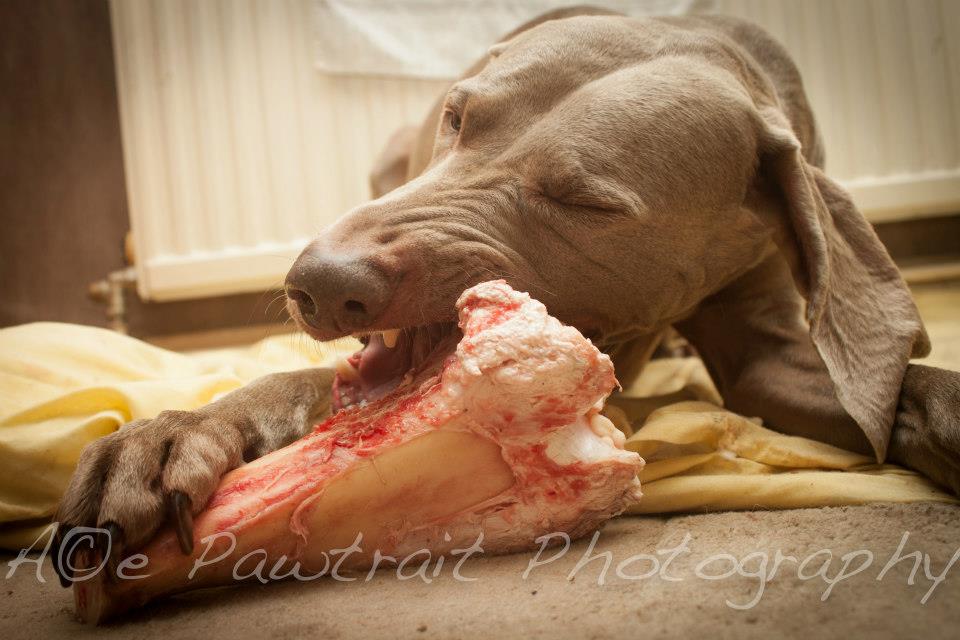|
When considering diet for any animal we have to look at it’s physical and biological make up. Basically it’s digestive system this is the biggest hint your dog is going to give you as to what it’s species appropriate diet is, So lets look at the hints that Dogs give us.
Dentition Dogs have 42 teeth that all have a specific role. The large carnassial premolars are used for cutting meat as well as molars for crushing bone, their canine teeth are for puncturing and holding prey, and the incisors for stripping feather and fur and finer meat from bones Digestive system Dogs don't have any digestive enzymes in their saliva, digestive enzymes only come from the pancreas stomach acid or bile, which is 10 times more acidic than that of a herbivore, this means they are more affective at digesting decomposing food stuffs and suffering no ill affect and internal intestine parasites are kept to a minimum because the food is not sugary or starchy and is processed quickly and means there is little food for the parasites as it is well processed by the host body. The carnivore stomach is 60% bigger than that of a herbivore, the intestine is shorter than a herbivore, this allows for quick-ingestion of nutrients and elimination of waste products. The domestic dogs diet compared to their wild relatives Yes dogs are domesticated but their physical and biological make up has not actually changed, that much from their wild counterparts, they are pretty much the same as wild canid species who hunt for prey and forage for certain berries They have evolved to have more digestive enzymes to be able to better digest carbohydrates and fruits and veggies. So why is it okay for us to feed a species appropriate diet to a captive wolf or African wild dog but not domesticated dogs? What did we do before the late 1800’s when kibble was first produced? I'll leave these two questions here for you to think about as you carry on reading. Feeding the Domestic dog Diet is a massive consideration when you get a pet, Cats are carnivores, there are aspects of their diet that they can only get from eating meat. Dogs are facultative carnivores which means they can survive but not thrive on a diet other than meat or can they????? And now here is the clash, vegetarians and vegans love animals and they want to have pets and give them long and healthy lives, but their ethics tell them that it’s wrong to feed one animal to another. Someone said to me today “It’s natural to feed a carnivorous animal meat” But is it really natural to feed what is left of an animal (the highly processed derivatives, in most cases) of an animal that was farmed for it’s meat or kept to produce milk or eggs? Natural to me would be prey model meat, whole rabbit or venison or game, not whats left of it after humans have had their bit, of course this sort of food is not easily come by. Now as a vegetarian of some 30 years, I understand this train of thought, I do though have my own views on this matter. I’m not the sort of person to tell anyone what to feed their dog, I prefer to give information about species appropriate diet and biology and let the owner make their own decisions, There are a few diets on the market that make me cringe, but I always advise feeding your dog what you can manage, what you can afford and what they will eat. Diet related allergic reactions You may notice your dog is suffering from ear complaints or itchy skin, this can often be attributed to diet, grains or a meat allergy or allergy to another ingredient, and should be considered when you speak with your Vet. A diet change or an elimination diet, could quickly solve this problem, although further investigation may be needed from your vet, they can do very specific allergy testing to see what causes your dog to react badly to certain food so you that you can remove them from the diet along with initially treating the condition topically. A Vegetarian or Vegan diet If you are a vegetarian or vegan and choose to feed your dog an ethically produced vegan or vegetarian diet, it may be worth considering a blood test to ensure your dog has all the correct blood chemistry and calcium and phosphorus ratios are correct for bone and muscle growth also that fat levels are high enough to give energy and there are essential fatty acids to help cell production in the brain. If the results come back and all is fine, then you have it right, if not then a rethink of the dietary components is needed, and your vet can help you with this. Would you consider feeding meat to your dog if the results came back that your dog needed it or if an allergic reaction could be solved by feeding meat? Raw food or BARF The same goes for raw feeding, you may spend a lot of time working out exactly what percentage of what your dog needs but each dog is different, a simple blood test again can help you to determine if the components are all correct or if you need to change anything. Getting this mix right is very important, there are ratio’s and a bit of simple maths involved, but if you choose to feed this diet these day’s we are lucky that suppliers have formulated ready made or complete raw food diets, to make things easier for us. Because of things like the calcium phosphorus ratio it’s quite important, particularly in growing pups that are raw fed. I have now raised 3 pups from 8-14 weeks old, on a raw diet. With my most recent pup I decided to get his calcium phosphorus levels checked by the vet, just to make sure I was doing okay, just for my own interest more than anything else, his levels came back fine slightly higher in calcium than phosphorus which was ideal and I now know for certain the way I've been feeding my dog all these years is correct. I didnt put him through the test just for the hell of it either, It's a simple blood test, he was having blood taken anyway for a titre test, to check is immune levels to DHP a few weeks post vaccine. I started feeding raw to my own dogs some 15 years ago, after reading Dr Ian Billinghursts books Give you dog a bone and The BARF diet, very interesting reads for anyone who is new to raw feeding. As a guide, not all dogs are the same and feeding exactly isn't always possible, a dogs diet should contain around 10-25% bone 15% offal 60-70% muscle meats 5-10% processed fruit and veg (some raw feeders don't advocate feeding veggies, but I do, because dogs are fucultative carnivores, and meats suffer such a lack of nutrients these day's, giving dogs extra in fruit and veg form can at least help them to get more nutrients) also feeding a variety of meats and fruits and vegetables improve the microbiome or bacteria in the stomach different bacteria in the stomach make it more able to cope with changes in the diet and less likely to have an adverse reaction when your dog eats something different So when you go to choose what you feed your own dog, do some research, check out the All about dog food website www.allaboutdogfood.co.uk, see how good all the well known brands score, look at their ingredients, and read the blog posts from people at the top of their game in dietary composition. Talk to your vet and talk to your dog trainer, there is a lot of information to take in, but at the end of the day you feed your dog what you choose, this is the best food for you and your dog. Remember to keep an open mind, you never know you may start to see allergic reactions in your dog or it's feces isn’t what it should be, then you may need to consider a dietary change. Have you ever thought about what goes into your dogs food the ethics of the food we feed our pets, and if you have how does it effect what you feed now? If this has sparked your interest why not check out your dog food on the www.Allaboutdogfood.co.uk website. |
AuthorClair Litster-Huckle has a BSc (Hons) in Animal Behaviour and Welfare and an MSc Animal Behaviour and Training and has studied Canine psychology and Canine diet and nutrition. Archives |
Proudly powered by Weebly

